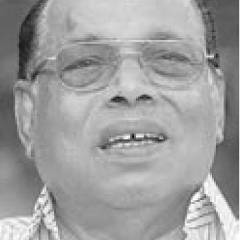Even though the drug Artemesinin, developed by Prof YouYou and used to treat malaria, received the Nobel Prize recently, it had been in use in India for some time now. It has been developed from Chinese traditional medicines and was developed by YouYou as existing medicines were not effective against Malaria.
Like in our nation, traditional medical systems are popular and much evolved in China. Perhaps it is much more developed there than in India. I had twice been to China to study their system of medicine. During my two visits, I had a chance to see and experience the developments in traditional medicine in China. I was happy to see that the people had great respect for traditional healers. In fact people turn to Allopathy only after trying traditional medicines. Even though we have many streams of traditional medicines in India, we do not recognise our healers or traditional medical practitioners.
In China, one can see two hospitals standing side by side. One would be practicing traditional medicine while the other would provide modern treatments. After the disease is diagnosed, traditional treatments get more preference. Allopathy is tried as a last resort. Patients are given the option to select his or her treatment mode and most would opt for traditional treatments.
Former leaders in China played a big role in making traditional treatments popular. For example, Mao made traditional treatments popular by opening clinics all over the nation. When a new medicine is discovered, Chinese researchers make all efforts to make it internationally acceptable and the government tries to keep its costs under control. The state bears the cost of the medicine for the workers.
While such achievements are possible in India, perhaps we lack the determination for it. I, who have been practicing traditional as well as modern medicine, have seen that traditional medicines are often considered as substandard by Allopathy doctors. About 65 per cent of the people are happy trying traditional means to get rid of common ailments and most of them are cured easily. Those in whom the disease persists approach Allopathy doctors who prescribe some medicines even though it might not be needed and only serves to satisfy the patient.
We need to unify all research in the field of Ayurveda and traditional medicine. The government has to recognise traditional healers and should not tag the line of British rulers who felt that traditional medicine had no basis. We need to collate and preserve the knowledge of traditional healers and combine them into one strong system of medicine. Let the achievement of YouYou invigorate the traditional system of medicine in India.





































































































































































































































































































































































































































































































































































































































Disclaimer
The comments posted here/below/in the given space are not on behalf of Manorama. The person posting the comment will be in sole ownership of its responsibility. According to the central government's IT rules, obscene or offensive statement made against a person, religion, community or nation is a punishable offense, and legal action would be taken against people who indulge in such activities.